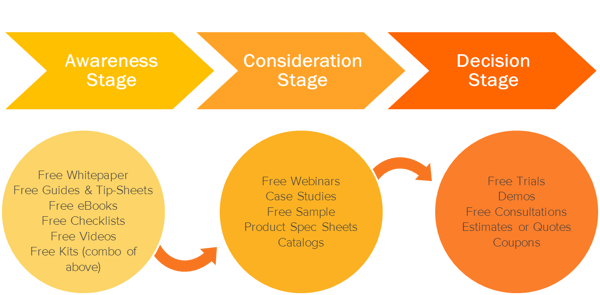
It is springtime here in New England! Trees are sprouting new leaves; tulips and daffodils are blooming, and the no-longer dormant grass is green again after a long winter. Homeowners are out in their yards doing spring cleanups and planting summer flowers and vegetables. People are crowding garden centers seeking advice and buying plants, fertilizers, and more for the summer growing season ahead.
 Marketing Landscape of Lead Nurturing tools, courtesy of Chiefmartec.com
Marketing Landscape of Lead Nurturing tools, courtesy of Chiefmartec.com Meaningful content is the essence of lead nurturing. It keeps your leads engaged and provides incentives to move forward in the Buyer’s Journey. For most effective nurturing, create content that maps to each stage of the Buyer’s Journey and ensure that it is highly relevant to the leads that resemble your company’s Buyer Persona. It is also essential to review and revise existing content to keep it up-to-date and relevant in a fluid business environment. Document your content development plans and timelines to achieve buy-in and obtain resources for implementation.
Offer premium content to educate your leads, delivering real value and becoming a trusted resource. Content quality, not quantity, is what matters, and the quality of your content is determined by its relevance! Even cutting-edge content will have little impact if it is irrelevant to your leads at their current stage in the buying process.
Awareness Stage: The buyer starts the process by hunting for the cause of a particular problem. So your awareness stage content should connect the problems addressed by your business with their probable causes. Strive to create “aha moments” where buyers gain new insights into what causes their problems; this increases the likelihood that they will view your website as a useful resource and revisit in the future. For awareness stage content, keep the focus on buyer education and refrain from blatant product promotion.
Consideration Stage: The buyer has determined the cause of the problem and is researching possible solutions. Content for the consideration stage should introduce the solutions provided by your company’s products and services.
Decision Stage: The buyer now understands what solutions are available and is ready to begin evaluating specific products and services. Content for the decision stage should include detailed product information, case studies, and product demonstration videos. At this stage, leads are fully qualified and ready to be turned over to your sales team for person-to-person contact.

Delivering relevant content to your leads distinguishes your business from competitors as your leads progress through the Buyer’s Journey. By educating your leads, your business gains competitive advantage by building trust and influencing purchase decision criteria.
Segment your leads according to their positions in the Buyer’s Journey. Use email drip marketing to deliver relevant content to the leads in each segment at just the right time to nudge them along toward sales-qualified status. Employ lead scoring to further differentiate each segment by level of engagement and Buyer Profile fit. When individual leads attain predetermined score thresholds, personalized emails with pertinent content can be transmitted to those leads automatically.
Implement an automated system to manage your lead segmentation and nurturing processes. There are currently over 50 vendors who offer a wide range of marketing automation software tools to fit specific needs. Ask us for a recommendation of a marketing automation solution that fits your needs and budget.
In addition to delivering content through email, offer a broad selection of easily accessible content to your leads through a variety of other sources including:
To more fully engage your leads, send email inviting them to subscribe to newsletters, participate in webinars, or attend upcoming user conferences. Use blog posts to announce new product releases, share editorial comments, explore industry trends, and invite reader feedback. Encourage your leads to participate in LinkedIn, Google Plus, Twitter and other social media platforms frequented by your customers, giving your leads the opportunity to share in social interactions between your business and your existing customer base.
Monitor the activity of your leads and make an effort to re-engage any leads that appear to stall or drop out of the process. Try to reconnect by offering new information with some incentive (i.e., a future purchase discount in return for watching an informational video now). If your efforts are unsuccessful, ask why their interest in your company has waned and whether they have dropped or postponed their search or given their business to one of your competitors.
There is an abundance of usage data generated by marketing automation software, website hosts, and social media. Leverage this data to monitor the activities of your leads and tweak your lead nurturing protocols. Analyze your usage data to obtain accurate answers to questions such as:
Lead Nurturing is an important element of the Inbound Marketing methodology. It shifts email engagement from "blast" outbound interruption methods to opt-in, person-to-person, humanized communication. If you would like to learn more about lead nurturing or Inbound Marketing, please download the 8 Steps to Attract Qualified Leads for your Business.
Bristol Strategy is a full funnel inbound marketing agency and inbound sales agency offering the full complement of Inbound Marketing services that enable our clients to surpass their business objectives by transforming the way they engage with their buyer online. Reach out to us to learn more about how our experience and capabilities can help your business grow.
Ask us about our unique approach that creates a full-funnel "inbound" engagement model for your business that attracts and converts digitally engaged prospects.